STANDING BETWEEN ART AND ARTIST
STANDING BETWEEN ART AND ARTIST
by Norman Warwick
I was actually reading the breaking on-line news of the death of Phil Spector when I received a text message from UK reader Marlene Bewick, thanking us for the recent inclusion of a tribute to Gerry Marsden, and at the same time pointing out to us the news about Phil Spector and wondering whether we would be covering it as she had been as much a fan of Spector´s sounds as much as she loved the pop of Ferry & The Pacemakers.
Well, Marlene, thank you for setting something of a tough task ! The arguments about whether or not we should like art if we know it has been created by a terrible person perhaps cannot be answered until a at least a few, and probably many, more questions have been asked.
I guess one the most important questions should ask who has defined the artists as a terrible person? Was that artist innately evil or rather someone who has been castigated because his thinking was not part of the political or social zeitgeist of the then or now?
I´m not sure if this a timely interjection here, but I have been fortunate throughout my adult life to have interviewed, often exclusively and in depth, and sometimes serially over a lengthy period of time, many of my greatest song-writing heroes. One or two of these heroes, to my amazement, seemed to have feet of clay. On every occasion I met him, the leader of my posse of heroes was surly, rude and non-communicative about everything except the chip he had on each shoulder that kept him balanced against a world constantly doing him down.
It should be said, though, that his songs contained codes to live by and opened gateways to a better world. He built and overlaid unique guitar chord structures and wrote more than two hundred songs that formed the belief system I have clung to all my life.
So, I came to dislike that artist,… in fact I thought he was a ´terrible person´ and felt uncomfortable whenever I was in his company. Nevertheless, whenever I put away my microphone, shook hands and left the interview location I would jump straight into my car and drive what invariably seemed to be hundreds of miles home, listening to his music all the way. No matter how tetchy our interview had been, how grumpy, disinterested or aloof he had seemed, his songs, to me, remained untainted.
Of course, to the world, that songwriter was not a ´terrible person,´ although I know plenty of people who found him to be moody and difficult to like. Nevertheless, such was his skill as an artist that he created a body of work that collectively and individually could stand up for itself, independently of their creator, as human beings often do independently of their creators, and still make a contribution to the world.

Nevertheless, in the debate that now, since the death of convicted killer, Phil Spector. rages down the sidetracks & detours of the information highway around the internet, a particularly creepy point, (because it is probably so true), was made by Pamela Trow, a life-long visual artist born at the start of the twentieth century.

Imagine you are in a waiting room of a dentist’s office. This nicely done watercolour portraying a serene European country scene hangs on the wall in front of you. Stare at it and for the moment you forget you’re waiting for a root canal. You wonder about the lives of the people crossing the old bridge. You imagine they’re going to visit their neighbours who live in the century old stone house. You picture them breaking bread on the wood country table, sharing the beauty of the moment while sipping the freshly churned milk from the cow relaxing in the field. Now, you pan to the artist’s signature…it reads “A. Hitler”. The dental assistant comes out and calls your name. Are you still there? I suspect you’re outta that dental office in the proverbial New York minute !´
However, Joshua Hoskins, who studied at San Francisco Art Institute, pointed out in response that:
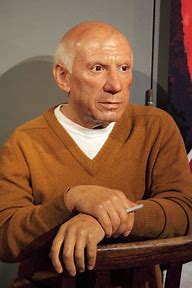
We make a mistake when we assume that the artist is forever linked to their art. It’s not a question of should we separate them but instead ask why do we continue to insist they were ever one thing to begin with? Doing so has led to some incredibly worrisome phenomena. For example, consider such headaches as “the celebrity”.
For 99.9% of human history the artist was never even considered. The phenomenon that is Picasso was probably not possible until after the renaissance.
When an artist creates a work of art and submits it to the world, the art becomes a part of society at large. Whatever reason the artist gives for producing the work, it is quickly subverted and made subordinate to society’s reasons. After all, the society created the circumstances which drove the artist to create the work !´
Spector was a troubled and troublesome man, but apart from his recordings, there is another example of his genius,…. that he worked with, and was accepted by, genius.
Geoffrey Himes rightly reminds us that in his early days Spector employed musicians who, dubbed the “Wrecking Crew” including such legendary figures as drummer Hal Blaine, keyboardist Leon Russell, guitarist Glen Campbell, bassist Carol Kaye, (one of The Throng Of Blowtown), guitarist Barney Kessell, trumpeter Herb Alpert, percussionist Sonny Bono, drummer Earl Palmer, keyboardist Harry Nilsson, saxophonist Art Pepper, keyboardist Billy Preston, keyboardist Larry Knechtel and arranger Jack Nitzche. I would agree with Geoffrey about their genius and legendary status, and they were viewed as being the ultimate professionals of studio musicians, but there were also a few ´troubled and troublesome´ souls among them.
Does any of the above, though, help us decide how to respond to the legacy of songs and recordings left by a convicted murderer?
Jonathan Landrum Jr. is an entertainment writer for Associated Press, and, on reporting of the record producer´s recent death, wrote that ´Phil Spector was viewed as a man with two distinct personas: The late music producer was regarded as a rock ‘n’ roll genius who elevated the genre with his Wall Of Sound style in the nineteen sixties and created hits for several big names from the Beatles to Tina Turner.´

However, even as Spector was making his name in the sixties and seventies as an original thinker and revolutionary music-producer, we heard it on the grapevine that he was regularly waving guns at recording artists.
Landrum makes the point that ´(subsequently) being convicted of murder overshadowed Spector´s artistry.´
That is perhaps a sweepingly conclusive statement, that I shall take further issue with later on, but disregards the fact that Spector, notwithstanding his artistry, was also something of an engineer and some of the technological developments and techniques he created in the recording studio are now part of the very fabric of recorded popular music, We cannot, and should not, undo those constructions because the man who invented them was a seemingly ´terrible person.´ Is Spector´s science to be overshadowed, too?
Spector was convicted of killing actress Lana Clarkson in 2003 at his castle-like mansion on the edge of Los Angeles. After a trial in 2009, he was sentenced to 19 years to life. California state prison officials said Spector died Saturday at age 81 of natural causes at a hospital. The reaction to Spector’s death resurrected some mixed feelings about his life and legacy.
Mr. Landrum puts all that fairly succinctly by saying that ´some lauded Spector´s early contributions to rock music, while others struggled to forgive his volatile past.´
Beach Boys musician Al Jardine said it would be ´nice to remember him only for his songs and production talents.´ He said The Ronettes’ song Be My Baby, which was produced and co-written by Spector, inspired Jardine’s friend and fellow Beach Boys member, Brian Wilson.

A phrase that could well gain traction and become indelibly linked to Spector was coined by Stevie Van Zandt, of Bruce Springsteen’s E Street Band, when he called the producer called Spector ´a genius irredeemably conflicted.´
´He was the ultimate example of the art always being better than the artist,´ Zandt tweeted, adding that Spector ´made some of the greatest records in history based on the salvation of love while remaining incapable of giving or receiving love his whole life.´
Meanwhile, The Price Is Right host Drew Carey took aim at Spector, calling him a ´murderer and an abusive maniac.´
´I wish he would’ve gotten the mental health help he so clearly needed, but he didn’t,´ the comedian said on social media. ´And so instead of *just* pulling guns on people in anger or for fun, he murdered one of them. Good ear for music though, I’ll give you that.´
Spector’s former wife, Ronnie Spector formerly the lead singer of the Ronettes, remembered him as a ´brilliant producer, but a lousy husband.´
´Unfortunately Phil was not able to live and function outside of the recording studio,´ she wrote on Instagram. ´Darkness set in, many lives were damaged. I still smile whenever I hear the music we made together, and always will. The music will be forever.´
But Darlene Love, who sang some of Spector’s hits from He’s a Rebel and He’s Sure the Boy I Love, took a different approach despite her problematic relationship with the producer. She felt sadness after hearing of Spector’s death from her son.
´It was sad because of what Spector did, the wonderful music he created, and then spent nearly 20 years of his life in prison,´ said Love.
She, nevertheless, acknowledged that Spector tried to control her talent during her singing career, and had a dangerous temperament at times, whilst saying that she will, though, try to remember the ´
I hope people don’t only remember the reason he spent those years in prison, but more or less what he did for rock ‘n’ roll,´ she continued. ´He changed the sound of rock ‘n’ roll. That’s what brought me to sadness.´

In writing the record-producer´s obituary, Landrum seems to share that view, reminding us that Spector was hailed as a visionary for pushing ´Wagnerian ambition into the three-minute song, creating the Wall Of Sound, in the sixties, that merged spirited vocal harmonies with lavish orchestral arrangements to produce such pop monuments as Da Doo Ron Ron, Be My Baby and He’s a Rebel.´
Bruce Springsteen and Brian Wilson openly replicated his grandiose recording techniques and wide-eyed romanticism, and John Lennon often called him ´the greatest record producer ever.´ Spector produced the standout solo single, Imagine, by John as well as George Harrison’s “My Sweet Lord.”
indeed, Geoffrey hime reminds us in his Paste piece that Spector also created the greatest album of Christmas music in history: 1963’s A Christmas Gift for You from Phil Spector.
Spector´s waving of guns at recording artists in the studio and threatening of women in his life would come back to haunt him after his victim´s death.
Lana Clarkson, star of Barbarian Queen and other B-movies, was found shot to death in the foyer of Spector’s mansion in the hills overlooking Alhambra, a modest suburban town on the edge of Los Angeles.
Until the actress’ death, which Spector maintained was an ´accidental suicide,´ few residents even knew the mansion belonged to the reclusive producer, who spent his remaining years in a prison hospital east of Stockton.
Although he had been inducted into The Rock And Roll Hall Of Fame in 1989, his recording artists began to quit working with him and more modern musical styles passed him by.
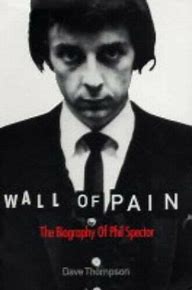
´He self-destructed in the most horrific manner,´ said David Thompson, the author of Wall Of Pain: The Biography Of Phil Spector, published in 2004. ´But we have to separate the two. There are so many people who were once revered then we find out they did something terrible. It wipes out all of their achievements. I don’t agree (that it should).´
Thompson said Spector’s biography was one of his toughest to write, because he wanted to solely focus on the music. It was whilst working on the book, though, that he found out about Spector’s conviction.
´That was a hard balance,´ he said. ´I wanted to write about the music, just what he did, what he created and what he gave us. But you had to sort of balance it, too, with the awful things he did.´
So, we started this article by pondering over whether it is ok to like art if we know that art has been created by a terrible person? I then posed the question of who is saying that person was terrible and I suppose I would post a warning that we should always consider that source.
Another question to be resolved is whether we as individuals or a collective CAN ignore or dislike we have always loved because we learn of something askew in the mind or attitudes of tis creator. Spector´s death has actually helped me clarify my thoughts on this, and we can´t stop our thought processes. Ever since he was found guilty and sentenced whenever I have heard any Wall Of Sound record I have thought, (in this order), ´wow, that wall of sound, that is amazing., All those layers. Phil Spector. Brilliant,……how could he been such a ´terrible person*?´ Great, great track, though.´
Although other adjectives and nouns are available* I doubt if that will ever change.
Spector wrote and co-recorded, as a member of The Teddy Bears, that To Know Him Is To Love Him and I have certainly never heard those sentiments applied to him, but listen again to that song, not only by Spector´s group but also by Dolly, Emmylou and Linda Ronstadt on their Trio album, and like me, you might feel like pardoning Spector all his sins.
I´m being facetious, of course, but in the words of that songwriter I couldn´t get along with, ´maybe some lonesome picker will find some healing in these songs´. If so, then we would have to face the fact that a convicted murderer has left behind an important legacy.
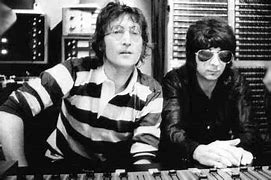
I still feel I am standing at the crossroads a bit here and agreeing with John Lennon who once spoke of Spector in words to the effect of liking the man´s music but not the man. I guess I most agree with the comment below, posted on-line, but that could have been uttered by anybody alongside me sitting on this fence.
Lyonel Perabo posted, below his name, that he hasan M.A. in Old Norse Religion, as if that in some way qualified his response to the question, about whether we should learn to separate the art from the artist?
´Yes and No.
So on one hand, it is important to differentiate. No-one’s perfect and if you want to only praise, follow or enjoy the works of someone with whom you one hundred per cent agree you’ll end up hating on everything and everyone.
On the other hand, it is important to recognize when someone’s ideology, religion, convictions and so on affect their creative output. In that sense even stuff we would categorize as ´bad´ can lead to creations which are in themselves good, or even great.
The key is not to agree, but to understand. That’s my take on it at least.´
So, if you are trying to forget Phil Spector, don´t read the following paragraph lest it reminds you,
Phil Spector played a vital production role in the recordings like Spanish Harlem by Ben E King in 1960, Under The Boardwalk four years later and Instant Karma by John Lennon another six years on.

Although I always considered Spector as a pop artist and producer he moved on to my turf as a songwriter occasionally as, for instance, when he co-wrote with the late, great John Prine (see our music archives for a feature on John) in the nineteen seventies. Intended for Prine´s Orange album, in production at the time the song, God Only Knows actually then lay dormant until John´s final studio album The Tree of Forgiveness, a few years ago.
Please don´t allow Spector´s abrasive personality and heinous crime distance you from the sublime Then He Kissed Me by The Crystals, and before you discard all things Spector from your memory ask yourself whether Christmas would ever be Christmas again without The Crystals´ version of Santa Claus Is Coming To Town.
It might be true that You´ve Lost That Loving Feeling for Phil Spector but surely you can´t lose it for The Righteous Brothers (and there is another point in this debate, do these recording artists deserve to be consigned to the foot of your record collection just because of their working association with the producer?). River Deep Mountain High was an incredible piece of song-writing by Jeff Barry and Ellie Greenwich, powered out by Ike and Tina Turner to an incredible Spector production.
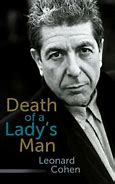
Another piece of Spector associated music that fell into my own ballpark was Leonard Cohen´s Death Of A Ladies´ an album title track some eight minutes long. The monastic Cohen and the bombastic Spector somehow created a lush, slightly jazzy, relaxed sound that worked in a surprisingly beautiful way..
Geoffrey Himes at Paste on-line reminds us that ´Spector later sank into a Citizen Kane-like retirement in California until it all ended in murder and prison.´ Himes agrees that unfortunately, when it came to Spector, to know him was NOT to love him. Nevertheless Himes suggests that ´it would be a mistake not to admire his work, for he created some of the greatest singles in the history of American music.´
Great art, you see, sometimes works because of its artist, and at other times even despite its artist.
sources: the writer´s own archives, Paste on-line writing by Geoffrey Himes and essay by John Landrum of Associated Press.

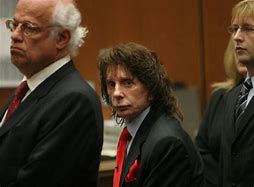


Leave a Reply
Want to join the discussion?Feel free to contribute!